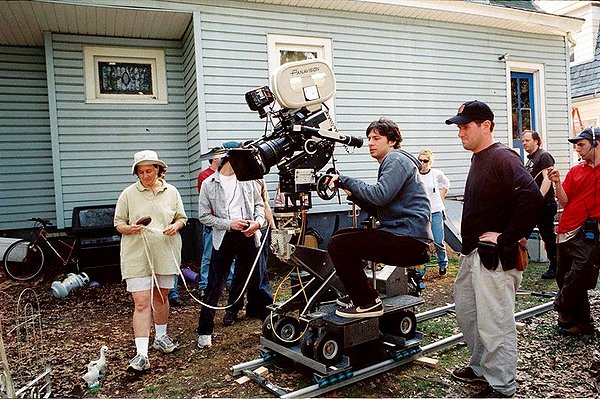 When it comes to financing movies, there is so much about the procedure I don’t understand. When Spike Lee was doing Malcolm X, he was complaining about how the studio didn’t want to give him more money. It was amusing, because director Norman Jewison was originally attached to do the film. Lee complained that only a black director would understand the struggles Malcolm went through. The two directors met, and Jewison decided to let Lee direct. Lee then went $10 million over budget (which was somewhere around $25 million, if memory serves). The studio gave him $5 million more. Then the movie was going over budget again, and the studio refused to give him more money. Lee did what he usually did. He claimed it was racism, and blah blah blah. The studio shot back something along the lines of, “We don’t think the movie will make enough money to warrant spending so much over budget.”
When it comes to financing movies, there is so much about the procedure I don’t understand. When Spike Lee was doing Malcolm X, he was complaining about how the studio didn’t want to give him more money. It was amusing, because director Norman Jewison was originally attached to do the film. Lee complained that only a black director would understand the struggles Malcolm went through. The two directors met, and Jewison decided to let Lee direct. Lee then went $10 million over budget (which was somewhere around $25 million, if memory serves). The studio gave him $5 million more. Then the movie was going over budget again, and the studio refused to give him more money. Lee did what he usually did. He claimed it was racism, and blah blah blah. The studio shot back something along the lines of, “We don’t think the movie will make enough money to warrant spending so much over budget.”
They also demanded it not be longer than two hours and 15 minutes (the movie ended up being 3 ½ hours). Finally, celebrities like Magic Johnson and Oprah Winfrey ponied up the money to finish the picture (Lee, to his credit, also used $2 million of his own). It ended up making over $45 million domestically, and got a few Oscar nominations. Yet it did make people realize, for the first time, that there’s a big business behind making a film.
 About 10 years ago, a singer/songwriter I like made a plea for money. Since Jill Sobule had a few big hits (Supermodel and I Kissed a Girl), I was surprised to read that she was dropped by her second record label. I have all her CDs, and they’re great. She wrote on her website that it would cost $58,000 to make another CD, and she wanted fans to donate. You got various things, depending on how much you donated. You’d get a copy of the CD, you could get your name in the album credits…some high spenders got a concert from her at their house. Other high donators would get their name into the last song on the record (it was actually a lot more cleverly written than you could imagine).
About 10 years ago, a singer/songwriter I like made a plea for money. Since Jill Sobule had a few big hits (Supermodel and I Kissed a Girl), I was surprised to read that she was dropped by her second record label. I have all her CDs, and they’re great. She wrote on her website that it would cost $58,000 to make another CD, and she wanted fans to donate. You got various things, depending on how much you donated. You’d get a copy of the CD, you could get your name in the album credits…some high spenders got a concert from her at their house. Other high donators would get their name into the last song on the record (it was actually a lot more cleverly written than you could imagine).
She cleared more than the amount she needed and a good CD was made (I bought it at one of her shows, not through a donation).
Tina-Desiree Berg, an actress (The Bold and the Beautiful, Giants, Reptilicant) and independent producer (currently working on the PBS cooking show Change the Menu), alerted me to a story that was in Variety magazine.
Zach Braff, former star of Scrubs, as well as the writer/director/star of the great indie film Garden State, used Kickstarter to fund his movie Wish I Was Here. He wanted $2 million, and quickly raised $3 million. At the time, a few people were talking about this new trend of celebrities using crowd-funding. It’s something that independent filmmakers should be using. For example, I interviewed comedic actor/writer Robert Townsend years ago, and he talked about maxing out his credit cards and being $50,000 in debt to make his movie Hollywood Shuffle.
 Kickstarter should be used by a new filmmaker like that, not Braff – who has millions of his own money and…perhaps taking a cue from Spike Lee…could’ve just used his own $2 million to make a movie of his choice.
Kickstarter should be used by a new filmmaker like that, not Braff – who has millions of his own money and…perhaps taking a cue from Spike Lee…could’ve just used his own $2 million to make a movie of his choice.
Even if Braff didn’t want to cough up the dough, surely he has a few famous friends that would’ve financed it.
Here’s where it all gets even more controversial. Braff ended up selling his movie to Focus Features, for a reported $2.75 million at Sundance this year. Now a few of the backers of the movie are wondering if they get any special benefits for their financial contributions. They were given a big fat “NO!”
The Kickstarter page states the legal position. It reads: “Current SEC laws prevent Kickstarter from offering equity or financial returns. Project creators keep 100% ownership of their work. Kickstarter cannot be used to offer financial returns or equity, or solicit loans. Some projects that are funded on Kickstarter may go on to make money, but backers are supporting projects to help them come to life, not financially profit.”
Oh, you do get some “perks,” I suppose. At the Sundance premiere, a few rows of seats were reserved for the high donating members of Kickstarter. Yet there were many more who donated that couldn’t even get tickets. They were also a bit upset that Braff didn’t even thank them when he introduced the film. That made me immediately think about Jill Sobule thanking her donators on the CD credits and in an actual song!
Spike Lee, who I mentioned earlier in his famous bitching about Malcolm X financing, has jumped in. He went with Kickstarter for Da Blood of Jesus. He quickly got the amount of money he was looking for, and he may have to deal with the same gripes the Braff fans had.
When Tina-Desiree Berg and I talked about this she said, “All the risk is eliminated, while the profits are increased. I’m not a fan. If someone wants to do a pre-sell thing where you are buying a DVD – fine. But don’t ask for more than $15 bucks and deliver the goods. If you are taking in millions, you need to form a 501©3 like you do with a PBS deal and give your patrons the tax write-off and correct placement. They don’t do that because they want the profits. This is as bad as guys like Jim Bakker.”

When I asked Berg why it would bother her this much, she explained, “The main problem I see with Kickstarter and IndieGoGo has to do with the elimination of financial risk. For the most part, filmmaking is a for-profit industry. You have investors and they should be rewarded with ROI if they invest in your project. Most film producers are not 501(c)3’s and they are clearly in it for the money. So, when you see wealthier well-known individuals pitching for money on these sites, it should give you pause. They are taking in a lot of money that they have no intention of repaying. Further, they are keeping 100% of the profits from film sales and advances. Those making the donations seeing none of the tax benefits of so-doing…unless, of course, the project is a legitimate 501(c)3. Unfortunately, that has been very few. In particular, the PBS show Onstage In America received financing this way. This was the correct way to go about it. It should be the norm and not the exception. When these sites first launched, I think the premise was supposed to be more akin to pre-sell. You donate 15 bucks and they’ll send you a DVD. But it has truly morphed into something that can effectively damage the way indie film production is financed and perceived. If you fleece your fans in this way, they will become disgusted. And rightfully so. They gave you more than $3 million. You collected $2.75 million in profit from the first sale, without putting any of your own money up – ergo, no risk, and without paying a dime of it back to your investors. All you gave them was a lousy T-shirt. Not a good trend.”
I told Berg about the story I wrote on comedian/podcast host Adam Carolla. I like the fact that Carolla offered lots of perks for people that donated (http://fox5sandiego.com/2013/08/13/you-can-be-in-a-movie-adam-carolla-tells-you-how/), that included writing a scene for the movie, appearing in the movie, a film credit, and various parties.
Berg had a great response for why that isn’t much better.
“So, if a comedian hopes to make it, they can pay Carolla $95 and they ‘might’ be used in the film. Musicians might get their song on the soundtrack. I find this sentimentality disturbing as well. It takes pay-to-play to the next level. Artists should be compensated fairly for the work they contribute, not bilked by the notion of a dream. This too, is a disturbing trend.”
Berg brought up something I had also wondered. Why when these guys speak of financing for a film, do they solely reference the studios. Indie films have never received majority financing from major studios. Berg adds, “Why do they exclude all the other possible sources? There is no mutual exclusivity here – it’s studio money or nothing.”
One of the other recent stories I heard about a film being made via Kickstarter, was written about in Men’s Journal a few months ago.
Matt Warshaw, who had an 816-page Encyclopedia of Surfing come out in 2003 (and spent three years researching), decided to have videos and pictures for the home page of the site. He ended up raising $26,000 on Kickstarter and funded the rest himself.
The website is ad-free, and runs on the support of donations. It’s registered as a nonprofit.
I asked Berg the next day, if she would be more accepting of all this funding if people like Spike Lee and Zach Braff had a system where you donate $20, you get a DVD, but if you donated $100 or some higher amount, you’d get money on the back end. All those investors would be paid back or make a profit, before Lee or Braff see profits for themselves. That would make it a risk/reward situation for those that donate. Berg responded, “Absolutely! I would applaud a crowd funding site that was set up for real investment. I would, in fact, participate.”



